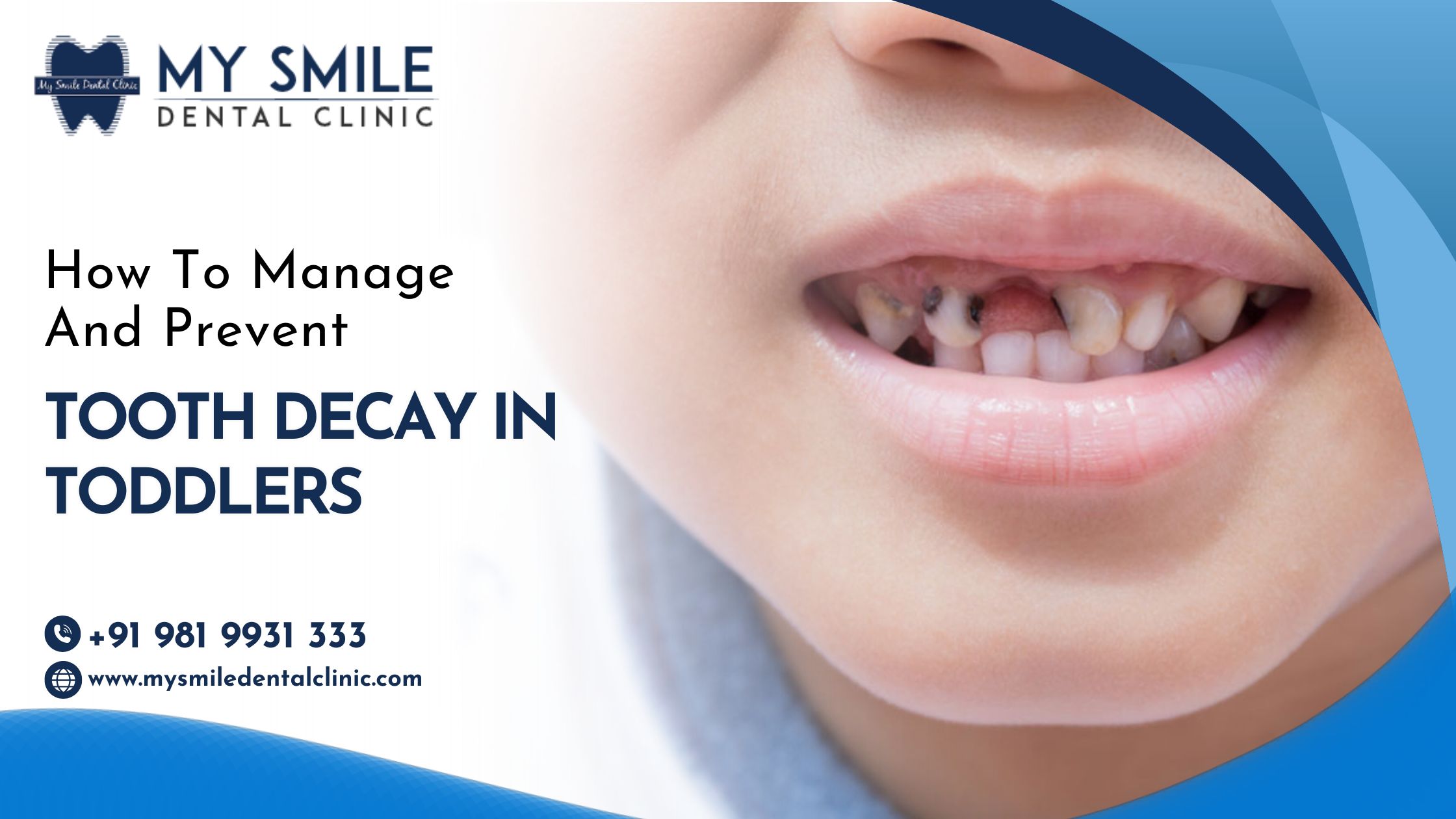
Tooth decay is the most common problem in toddlers. As a parent, it’s important to understand how to manage and prevent tooth decay to ensure your toddler’s teeth stay healthy and strong. In this blog, you will explore practical tips and information on protecting your little one’s teeth from tooth decay.
What is Tooth Decay in Toddlers?
Cavities, commonly called dental caries or tooth decay, are caused by oral bacteria that consume sugars from food and beverages. These bacteria produce acids that can erode the enamel of the teeth, leading to holes or cavities. In toddlers, tooth decay is particularly concerning because their baby teeth are placeholders for permanent teeth. Untreated dental decay can affect the development of permanent teeth in addition to causing pain and disease.
How to Prevent Tooth Decay in Toddlers
When it comes to treating dental decay, prevention is always the best course of action. Here are a few practical strategies to lower the risk:
1. Start Early with Oral Hygiene
Even before your toddler's first teeth appear, cleaning their gums is important. After feedings, gently wipe their gums with a soft, clean cloth. This helps remove any residual sugars and bacteria that could contribute to decay. Once the first tooth appears, typically around six months, brush with a soft-bristled toothbrush and a tiny smear of fluoride toothpaste. You don’t need to use a large amount—just a tiny dab is sufficient. Encourage brushing twice daily—once in the morning and once before bed. As your toddler grows, help them brush their teeth until they can do it themselves, usually around age 6 or 7.
2. Limit Sugary Foods and Drinks
Sugar is one of the major causes of tooth decay. Toddlers are often drawn to sugary snacks, juices, and drinks, which can fuel the harmful bacteria in their mouths. Try to limit sugary treats, sodas, and fruit juices, especially between meals. Instead, offer healthier snacks like fruits, vegetables, and cheese, which can be less harmful to their teeth. Consider using a cup instead of a bottle if your toddler consumes sugary drinks. Bottle-feeding, especially while the child is falling asleep, can increase the risk of cavities as the liquid pools in their mouth overnight.
3. Use Fluoride
A mineral called fluoride strengthens tooth enamel and increases its resistance to acids, preventing tooth decay. Make sure your toddler gets enough fluoride. Most tap water contains fluoride, but if you’re using bottled water, check if it includes fluoride. Additionally, fluoride toothpaste helps protect your child’s teeth. However, only use a very small amount of toothpaste until they are old enough to spit it out properly (usually around age 3).
4. Avoid Frequent Snacking
Snacking the entire day can increase the risk of tooth decay because it allows food particles to linger in the mouth and bacteria to continuously produce acid. Encourage your toddler to have regular meals rather than frequent snacks. If they need a snack, choose something healthy like raw vegetables or fruit, which are less likely to cause cavities.
5. Visit the Dentist Regularly
It’s recommended to the parents that you must take your toddlers for their first dental check-up by age one or within six months of the eruption of their first tooth. Regular dental visits allow your pediatric dentist to monitor your child’s oral health, identify any early signs of tooth decay, and provide guidance on proper oral care. Your dentist may also apply a fluoride varnish to your toddler’s teeth for added protection.
How to Manage Tooth Decay in Toddlers
If you notice any signs of tooth decay, such as brown spots, pain, or sensitivity in your toddler’s teeth, it’s important to take the action in order to save your toddler's oral health. Here are some steps to help manage tooth decay:
1. Visit the Dentist Promptly
See your pediatric dentist right away if you see any indications of tooth decay. In order to stop the degradation from getting worse or spreading, early identification is crucial. To improve the condition of your toddler's teeth, the dentist could suggest fillings, fluoride treatments, or other operations.
2. Pain Relief
If your toddler is experiencing discomfort due to a cavity, talk to your pediatrician or dentist about safe ways to manage the pain. Over-the-counter pain relievers in appropriate doses for toddlers can help reduce pain and inflammation until you can get to the dentist.
3. Monitor Eating and Drinking Habits
Closely monitor their eating and drinking habits. Try to follow the preventive tips mentioned above to avoid further damage to the teeth. This may include limiting sugary foods, using fluoride toothpaste, and continuing with regular dental visits.
Tooth decay in toddlers is a serious concern, but it is preventable and manageable with the right approach. You can keep your toddler's teeth healthy for years to come by avoiding sugary foods, using fluoride toothpaste, practicing proper oral hygiene from an early age, and scheduling routine dental checkups.
If you are looking for kids dental treatment in Andheri West, book an appointment with My Smile Dental Clinic for the best oral care.

